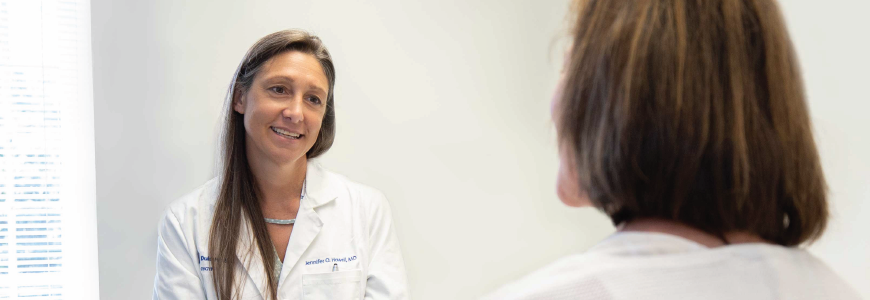Duke’s Department of Obstetrics and Gynecology has several specialists with advanced expertise in treating menopause as certified by the Menopause Society. They can offer novel treatment options as well as in-depth counseling to patients with complex histories and needs.
These specialists welcome referrals of patients who have complicating conditions such as cardiovascular risk factors (including hypertension or a history of blood clots or stroke), chronic pain, osteoporosis, anxiety, advanced age, or a history of breast cancer. They also welcome patients who might benefit from hormone therapy but are reluctant to try it.
Practitioners earn the credential by passing an exam administered by the Menopause Society (formerly known as the North American Menopause Society) and fulfilling yearly educational requirements, according to MargEva Cole, MD, an obstetrician-gynecologist at Duke.
“The certification reflects the extra knowledge and expertise that come from continual learning through formal reading, education, and attending conferences, as well as many years of learning on the job that every woman has a different set of symptoms and concerns,” Cole says. She finds great value in an annual day-long update seminar at the Menopause Society meeting that reviews the latest findings in menopausal endocrinology, impact of co-morbidities, treatment options, and more.
The great changes in the perception of hormone therapy highlight the need for this kind of study, according to Jennifer Howell, MD, another certified obstetrician-gynecologist. A menopause specialist can help both patients and primary-care doctors who are confused by evolving and apparently conflicting recommendations.
“In the 1990s, we kind of considered hormone therapy the fountain of youth and prescribed it to everyone,” Howell says. “When the Women’s Health Initiative study came out in the early 2000s, it seemed to have more risks than benefits. I have continued to follow the data and to prescribe it to certain patients based on a nuanced understanding of each individual’s situation.”
“A lot of what we do is counseling on ways to approach your menopausal symptoms and laying out the options,” Cole says. “Sometimes the patient has a long list of questions, and it can be difficult to untangle how much their symptoms relate to menopause rather than a different concern. We have more time than another provider might to lay out the options and let patients feel empowered to make their choices.”
An example of this kind of patient might be a woman with menopausal symptoms as well as chronic pain or fibromyalgia. Cole says that such a patient might benefit from a neurologic medication like gabapentin, which can help them with hot flashes, sleep, and chronic pain.
Or a patient with a history of hormonally sensitive breast cancer who has hot flashes, palpitations, and difficulty sleeping because of anxiety about their breast cancer diagnosis could benefit from a low dose of a medication also used for anxiety or depression, such as an SSRI or SNRI. “Sometimes we can kill two birds with one stone,” Cole says.
Howell adds: “I keep up to date on new products that your average OB-GYN might not have heard of.” She is open to prescribing off-label drugs like testosterone or new alternatives, such as Veozah (fezolinetant), a nonhormonal treatment of moderate-to-severe vasomotor symptoms.
